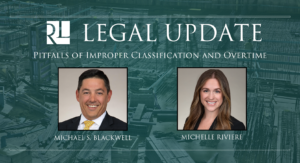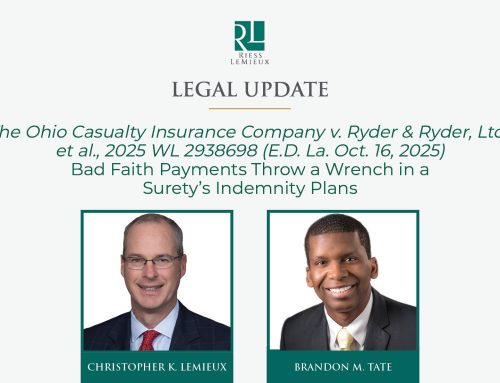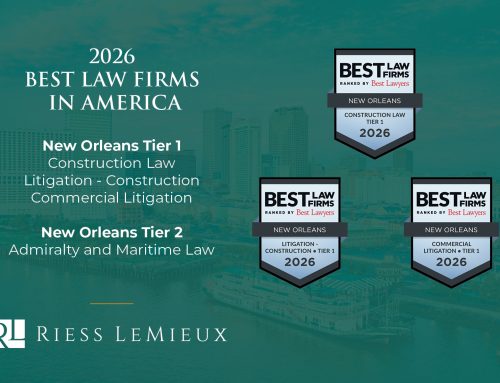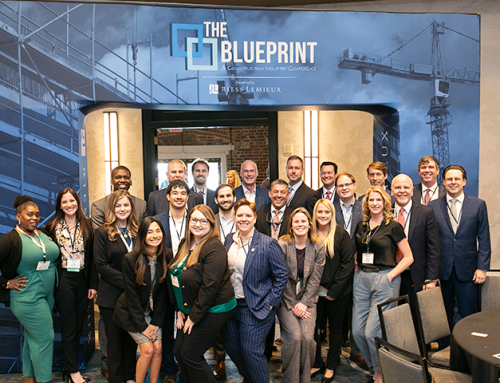 Mark Shaw, et al v. Alpha Air Heating & Air Conditioning, LLC, et al: Pitfalls of Improper Classification and Overtime
Mark Shaw, et al v. Alpha Air Heating & Air Conditioning, LLC, et al: Pitfalls of Improper Classification and Overtime
Authors: Michael S. Blackwell and Michelle Riviere
In Mark Shaw, et al v. Alpha Air Heating & Air Conditioning, LLC, et al, Mark Shaw and Daniel Oquendo (“Plaintiffs”) were hired by Alpha Air Heating & Air Conditioning, LLC, and its owner Derek Granger (“Defendants”). The Plaintiffs provided manual labor services for the Defendants, and these services included installation and repairs of HVAC Systems. The Plaintiffs each worked overtime hours and earned commission.
Although Plaintiffs were employed by Defendants, Defendants improperly categorized the Plaintiffs as independent contractors, resulting in Defendants failure to pay the Plaintiffs in hourly wages, overtime wages, and commission. The Plaintiffs then filed suit against the Defendants under the Fair Labor Standards Act (“FLSA”) and Louisiana Wage Payment Act (“LWPA”) for Alpha Air’s failure to pay the Plaintiffs in hourly wages, overtime wages, and commissions.
On Partial Motion for Summary Judgment, the United States District Court for the Eastern District of Louisiana considered the following: (1) whether the Plaintiffs were employees of the Defendants; (2) whether the Plaintiffs’ work was covered under the FLSA; (3) whether the Plaintiffs’ fell under any exemptions within the FLSA; and (4) whether the Defendants have no good faith defense against liquidated damages. The Court ruled in the affirmative on all four issues and granted the Plaintiffs’ Motion.
First, the Court ruled the Plaintiffs are employees of the Defendants. The Court noted that the ultimate conclusion an individual is an employee under the FLSA is a legal determination rather than a factual one, and it applied the “economic realities” test enunciated by the Fifth Circuit. Under this test, the Court considered (1) the degree of control exercised by the alleged employer, (2) the extent of the relative investments of the worker and alleged employer, (3) the degree of which the worker’s opportunity for profit and loss is determined by the alleged employer, (4) the skill and initiative required in performing the job, and (5) the permanency of the relationship.
The Court found that all five factors weighed in favor of the conclusion Plaintiffs were employees of Defendants because the Defendants exercised a significant amount of control over the Plaintiffs’ work, the Defendants supplied the Plaintiffs with substantial amounts of equipment and materials, including trucks, uniforms, and HVAC systems, the Defendants exercised control over the Plaintiffs’ opportunity for profit or loss, the Plaintiffs lacked specialized skills before being hired by Defendants, and the Plaintiffs were hired on a exclusive and permanent basis rather than a “project-by-project” basis.
Second, the Court ruled the Plaintiffs were covered under the FLSA. Individual coverage is triggered if the employee’s work has “regular contact with commerce, no matter how small” whereas enterprise coverage is triggered when an employer “has employees handling, selling, or otherwise working on goods or materials that have been moved in or produced for commerce by any person” and the employer has gross annual sales of $500,000. Because Plaintiffs installed and serviced heating and air conditioning around the New Orleans area, acquired HVAC equipment from local suppliers, and proved that the Defendants had gross sales of at least $500,000 during their employment, Plaintiffs were protected under both individual coverage and enterprise coverage within the FLSA.
Third, the Court ruled the Plaintiffs were not exempt from overtime pay. The FLSA exempts those who are employed in a “bona fide executive, administrative, or professional capacity….” However, employees who “gain the skills and knowledge required for performance of their routine manual and physical work through apprenticeships and on-the-job- training” are not exempt from overtime pay. Because the Plaintiffs were paid hourly, had little-to-no training prior to their employment, and their work consisted primarily of manual labor, the Court found neither were exempt from overtime wages under the FLSA.
Lastly, the Court ruled Plaintiffs were entitled to liquidated damages under the FLSA. Under the FLSA, an employer who violates the overtime provisions is liable for an employee’s unpaid overtime compensation in an additional equal amount in liquidated damages. Although a district court can deny liquidated damages if the employer demonstrates its failure was in good faith, this Court denied such waiver. Because the Defendants admitted that they had no good faith defense during discovery, the Court found that should the Defendants be liable to Plaintiffs, the Plaintiffs are entitled to liquidated damages under the FLSA.
Ultimately, the reality is that employers, including contractors, will routinely classify those they retain unbridled control over as independent contractors to avoid payments for overtime. However, regardless of an employer’s personal classifications, the economic realities test serves as the final determinator for whether or not one is entitled to overtime pay.



